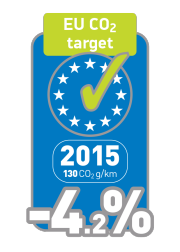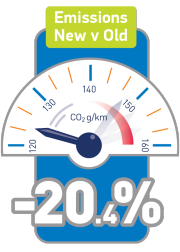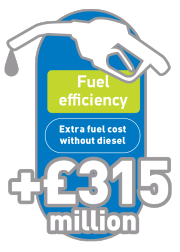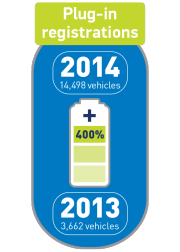- UK average new car CO2 emissions fall to all-time low of 124.6g/km, beating EU target by 4.2%.
- Britain surges ahead in Europe, selling more plug-in cars than any other country.
- Record 68.6% of car buyers now paying zero first year tax, putting current regime under scrutiny.
The UK has once again beaten CO2 emissions targets, with the average new car in 2014 posting CO2 emissions 4.2% below this year’s EU-wide target of 130g/km, according to a Soc
The annual SMMT New Car CO2 Report 2015 reveals that carbon tailpipe emissions have fallen for the 17th consecutive year to an all-time low. In 2014, new cars averaged just 124.6g/km, beating last year’s record average by 2.9% and 2007 levels by almost a quarter (24%).
The shift to more efficient diesel and petrol engines has been critical to this success, while significant growth of the alternatively fueled vehicles (AFV) market has also contributed. Sales of plug-in vehicles increased fourfold to 14,498 in 2014 and, for the first time, the UK surged ahead in Europe, registering more new plug-ins than any other country. By the end of the year, there were 52,000 AFVs, including hybrids, plug-ins and range extenders, on the road – a 58.1% increase on 2013.

However, this tremendous success raises questions about the future shape of taxation and incentives in the UK; questions that will be a priority for the next government. Today, SMMT publishes a second report2 by the Centre for Economics and Business Research (CEBR), which explores the challenges that must be met to sustain further long-term reductions in CO2, while also continuing to deliver sufficient revenue to government.
With a strict new EU-wide CO2 target of 95g/km by 2020, much is at stake, and the CEBR report recommends a moderate and fair approach to reform to avoid undermining future uptake of the newest, cleanest cars. Demand for these vehicles must be maintained, alongside support for the development of the next generation of low carbon technology. SMMT is calling on the next government to work closely with industry when it reviews the motoring taxation regimes, to ensure balance, fairness and stability in the market, and to reflect industrial strategy ambitions.

The SMMT New Car CO2 Report 2015 and The CEBR Future of Motoring Taxation Report are available to download here.









